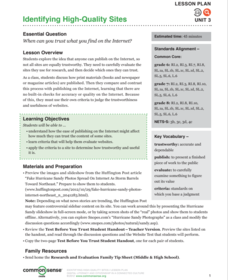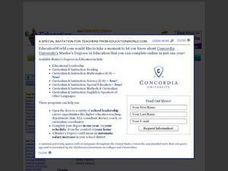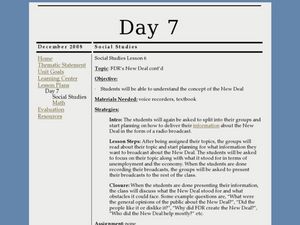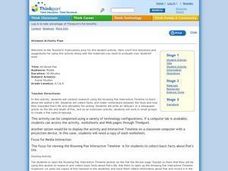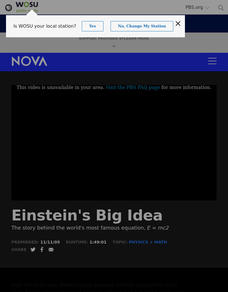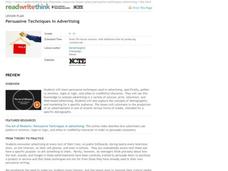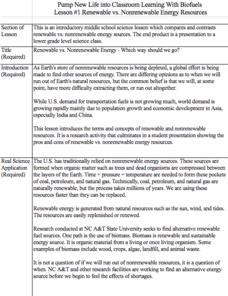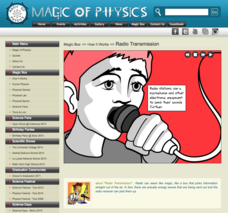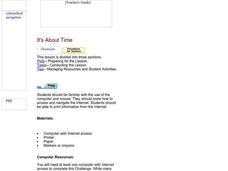Common Sense Media
Identifying High-Quality Sites
Use a Huffington Post article focused on false pictures of Hurricane Sandy to launch a discussion about the reliability of online information. Groups compare and contrast how print and broadcast media regulate data gathering with the...
Curated OER
Weather
Students create a daily weather forecast including present temperature, high temperature, moon phase, sky watch, and occasional special reports dealing with weather phenomenon.
Curated OER
"And That's The Way It Is..." Today in History
Students research an event in history from different perspectives. They discuss the characteristics of a nightly news broadcast and create their own based on the history event they researched. They work together to produce this...
Curated OER
Watching the Clock: An activity to build media-savvy students
Students analyze time constraints on broadcast news. They apply data collecting and data display skills. They identify the difference between news progams and the evening news.
Curated OER
The War of the Worlds
Students discover the concept of media based on literature. In this War of the Worlds lesson, students read the novel The War of the Worlds by H.G. Wells and listen to the 1938 radio broadcast adaptation by Orson Welles. Students then...
Curated OER
A Movie in Your Mind: Persuasive Text
Students listen to a broadcast of War of the Worlds and illustrate what they hear. In this persuasive text lesson students prepare for making a movie poster intended to persuade a director to make a film based on a short story.
Curated OER
Worship in Early Times
Students listen to and discuss three radio broadcasts that deal with worship in early times. They investigate a wide range of historical sources and piece together evidence of the past, Celtic beliefs and how early people worshiped...
Curated OER
Glacier Presentations
Young scholars research news articles relating to global climate change. In this earth science lesson, students create a news broadcast using the information they gathered. They present this in class and each student gives their peer...
Curated OER
Spelling Skills
For this spelling worksheet, students read a list of 20 words. Students underline the smaller word within each word. For example, students underline the word broad in broadcast.
Curated OER
FDR's New Deal
Young scholars explore the facets of the New Deal. In this Great Depression lesson, students research the New Deal and then create radio broadcasts that explain the New Deal to the American public.
Curated OER
Telegram from Senator Joseph McCarthy to President Harry S. Truman
Young scholars research the McCarthy hearings to determine the following: time frame of hearings, how they were broadcast, how the press reacted, and how the American people reacted in light of the Korean Conflict and the Cold War.
Curated OER
All About Poe
Students use an online database to research the life and words of Edgar Allan Poe. Using the information they collect, they write a newspaper article or obituary about the famous writer. In groups, they work together to develop a radio...
Curated OER
The Case of the Electrical Mystery
In this electrical mystery worksheet, learners watch a television broadcast called "The Case of the Electrical Mystery". They answer 8 questions about how detectives solve problems presented in the segments. Topics include hypothesizing,...
Curated OER
Radio Waves
For this radio waves worksheet, students read about how broadcasting uses radio waves to deliver sound and how radio signals are received. Then students complete 3 short answer questions.
Curated OER
NOVA Online/Einstein Revealed
Welcome to the companion Web site to the NOVA program "Einstein Revealed," originally broadcast in October, 1996. This two-hour special presents a penetrating profile of Albert Einstein, who contributed more than any other scientist to...
Curated OER
Conversation Lesson: News
In this conversation lesson worksheet, 7th graders use context clues to get the meaning of 8 words, then select 6 news stories from a list of 12 and explain why they would choose those for an evening TV news broadcast.
Curated OER
Cartoons for the Classroom: All Eyes on Iowa
In this current events learning exercise, students analyze a political cartoon about the Iowa caucus and respond to 3 talking point questions.
ReadWriteThink
Persuasive Techniques in Advertising
Help your 21st century learners develop their media smarts with this resource that has them examine the persuasive techniques advertisers use to influence specific demographics and then to use these techniques to craft their own ads.
Mikva Challenge
Deconstructing Campaign Messages and Perceptions
Target audience, covert message, explicit and implicit appeals. As part of an investigation of rhetorical devices used in campaign ads, class members examine and deconstruct the appeals in logos from the 2008 election. They then use the...
Media Education Lab
Sponsored Content as Propaganda
What is sponsored content? Who produces sponsored content? Why? Is it fair or unfair? What are the privacy implications for consumers? To answer these questions, class members view a model screencast before crafting their own that...
Kenan Fellows
Renewable vs. Nonrenewable Energy Resources
Is one type of energy inherently good or bad? Young scientists explore energy resources in a week-long unit. After extensive research, groups create powerful position statements and presentations supporting their energy resource of choice.
Magic of Physics
Radio Transmission
Radio waves are all around us! How do they transmit sound? Using an interactive, scholars examine how songs travel through the air. The resource explains the process from the radio station, to signal towers, to the radio unit. A look at...
Curated OER
It's About Time: Olympics, Winter Sports, Math, Media, Time Zones
Students use the Internet to determine broadcast times for the Winter Olympic Games snowboarding competitions. In determining these times, they need to consider time zones throughout the world.
Curated OER
Meteorologist Me: Climate and Weather Case Study
Fifth graders research weather and climate for selected cities and create identification cards within a database. They prepare an oral presentation on a simulated on-location weather broadcast.


